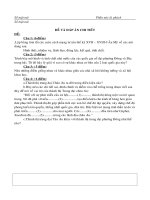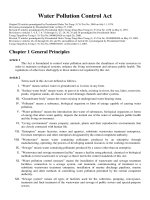General principles GP set 10 behavioral med a
Bạn đang xem bản rút gọn của tài liệu. Xem và tải ngay bản đầy đủ của tài liệu tại đây (93.86 KB, 3 trang )
High Yield Warm-up Questions: Behavioral Medicine, Part A
GENERAL PRINCIPLES SET 10: BEHAVIORAL MEDICINE, PART A
1.
One minute after birth a physician obtains an APGAR score for a newborn female. The newborn’s heart rate is
88 beats per minute. How many points would the female receive for this observation?
2.
A normal healthy newborn smiles when he sees his mother’s face after he awakens from a nap; however, he
does not smile when he sees the face of his grandmother. Approximately how old is this newborn in weeks?
3.
A newborn female is noted to have low blood glucose levels and polycythemia. If the physician feels that these
problems were caused by the infant’s birth weight, how much did the infant weigh at birth?
4.
A young female notices that her areolar diameter begins to enlarge. The female is in what stage of Tanner
development?
5.
A 44-year-old stockbroker comes to the physician for an annual examination. He indicates that he is working
approximately 80-90 hours per week and is currently going through a divorce and custody battle for his three
children. If laboratory results are obtained in this patient, the physician is likely to see an increased level of
what hormone?
6.
A 19-year-old female comes to the physician because she feels that she is overweight and is requesting that he
prescribe some ‘diet pills’. The patient is 5 feet 4 inches tall and weighs 39 kilograms. The calculated BMI is
14.8. Should the physician provide the patient with information on how to lose weight and/or prescribe a diet
aid?
1
High Yield Warm-up Questions: Behavioral Medicine, Part A
7.
A 68-year-old female comes to the physician for a biannual examination. During the examination, the patient
indicates that she has been awaking more frequently in the middle of the night over the past several months. Is
this a normal finding for an elderly patient?
8.
Why are intramuscular injections not a preferred route of drug administration in an elderly patient?
9.
An 81-year-old female is brought to the physician by her daughter because she is becoming more forgetful. She
used to pay her bills, cook and clean on her own but recently she began receiving shut off notices for her
utilities and is unable to prepare a well-balanced meal. Is the patient’s condition likely related to a decrease in
intelligence?
10. A 52-year-old female has a mammogram because she finds a lump in her left breast. A biopsy confirms the
diagnosis of invasive ductal carcinoma of the breast. When the physician tells the patient about the findings the
patient requests to see the ‘actual’ laboratory results to make sure that the physician is reading them correctly.
The patient then starts screaming at the physician indicating that she has made an egregious error and has
provided her with the test results of another patient. The physician ensures the patient that these are her results
and begins discussing the patient’s treatment options. Is this patient’s response considered normal according to
Kubler-Ross?
11. A 23-year-old female comes to the physician because she reports that when she is in a public place she thinks
that she hears her husband calling her name. She indicates that she recently attended the funeral of her
husband after he was killed while serving in the military overseas. Is this a normal part of the grieving process?
2
High Yield Warm-up Questions: Behavioral Medicine, Part A
12. A 62-year-old female comes to the physician two weeks after her husband died. She states that since her
husband passed away, she has been unable to eat, has insomnia and continually cries. She also indicates that
she has not felt ‘like herself’ for the past 4 months after her husband was initially diagnosed with cancer.
Should the physician prescribe an antidepressant?
13. The parents of a 4-year-old boy are awakened in the middle of the night because they hear their son screaming.
When asked what made him scream, he said he had a dream that ‘bigfoot was coming to eat him’. Would this
incident be classified as a nightmare or night terror?
14. A 24-year-old medical student comes to the physician because of frequent headaches. She also indicates that
she has moderate dull pain in each of her cheeks which tends to be worse in the morning. Her past history is
significant for excessive caffeine intake and smoking cigarettes. Her husband states that she commonly grinds
her teeth in the middle of night. What is the most likely diagnosis?
15. A 65-year-old male with congestive heart failure is diagnosed with central sleep apnea. What impact would this
new diagnosis have on the patient?
These question sets are intended to be completed before viewing the High Yield course lectures.
Video explanations can be found on the Warm-up Questions page within the online High Yield course.
For further review of the topics covered in this set, refer to the following lectures:
Behavioral Medicine and Ethics:
• Child and Adolescent Development
• Geriatric Health and Grief
• Sleep and Sleep Disorders
3









